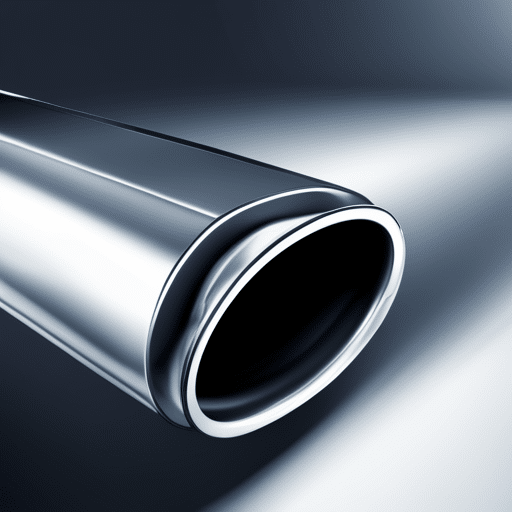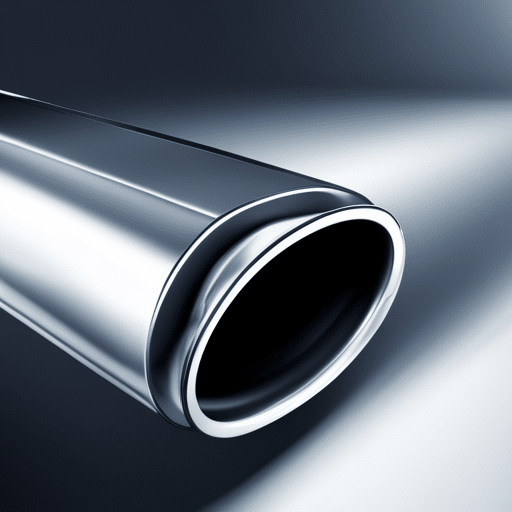
A car is a marvel of engineering, with numerous components working in harmony to deliver smooth and efficient operation. One such crucial component, often overlooked, is the muffler on a car. A part of your vehicle’s exhaust system, the muffler, located at the rear bottom, plays a vital role in dampening vehicle emissions and engine noise. It is meticulously designed to dissipate the loud sounds created by the engine’s pistons and valves, ultimately ensuring a quieter, more enjoyable ride.
Understanding the Muffler on a Car
Mufflers are constructed from steel and coated with aluminum to provide robust protection against heat and chemicals released from the exhaust system. But how does a muffler work? The answer lies in the understanding of sound itself.
Sound is essentially a pressure wave formed from vibrations – pulses of alternating high and low air pressure. As the exhaust valve opens, high-pressure gases collide with low-pressure molecules, creating these pressure waves. This process, occurring every time your engine combusts, produces powerful sound waves.
Mufflers, in response, employ a technique called destructive interference to quell these sound waves. Inside a muffler, you’ll find tubes with perforations that guide sound waves through the system. These waves enter through a central tube, hit a back wall, then pass through holes to reach the center chamber. From there, the sound waves travel into the resonator chamber, reflecting off its walls at precise timings to cause destructive interference. This interference cancels out the original sound wave, leading to a significant reduction in noise levels.
Importance of the Muffler on a Car
The role of a muffler extends beyond just noise reduction. By ensuring a smoother exit for exhaust gases, mufflers enhance engine performance and efficiency. They also aid in reducing harmful emissions, thus contributing to a more environmentally friendly vehicle operation.
Common Muffler Issues and Their Signs
Like any other vehicle component, mufflers can develop issues over time. Excessive noise, decreased performance and fuel efficiency, and visible damage or rust are common signs indicating a possible muffler problem. Regular inspections can help catch these issues early and prevent more serious damage.
Basic Maintenance of Car Mufflers
Maintenance of car mufflers includes regular inspection, timely repair of minor issues, and prompt professional help when needed. This not only ensures a quieter ride but also helps prevent potential engine damage and maintains overall vehicle performance.
Choosing the Right Muffler for Your Car
Mufflers come in different types, each with its unique features. The choice of a muffler depends on various factors such as your car model, usage, and desired noise level. A proper understanding of how mufflers work can help in making an informed decision.
The muffler on a car is much more than just a noise-suppressing component. It plays a significant role in ensuring optimal vehicle performance and environmental sustainability. Understanding its function and importance, along with adequate maintenance, can go a long way in ensuring a smooth and enjoyable driving experience.
Muffler on a Car: FAQs

What is the primary function of a muffler on a car?
The primary function of a muffler is to dampen the loud sounds produced by the engine’s pistons and valves. This noise reduction leads to a smoother and quieter driving experience.
How does a muffler work?
Mufflers work by using the principle of destructive interference. When high-pressure exhaust gases are released into the exhaust system, they create powerful sound waves. The muffler, with its perforated tubes and carefully designed chambers, directs these sound waves in such a way that they cancel each other out, effectively reducing the noise.
Besides reducing noise, what other roles does a muffler play?
Besides noise reduction, mufflers aid in enhancing engine performance and efficiency by ensuring a smoother exit for exhaust gases. They also contribute to environmental sustainability by reducing harmful emissions.
What are some common issues with mufflers?
Common issues with mufflers include excessive noise, decreased performance and fuel efficiency, and visible damage or rust. These can be signs of underlying problems that need immediate attention.
How can one maintain a car’s muffler effectively?
Muffler maintenance includes regular inspection, addressing minor issues promptly, and seeking professional help when needed. Proper maintenance not only prolongs the life of the muffler but also contributes to overall vehicle performance.
How does one choose the right muffler for their car?
The choice of a muffler depends on factors like the car model, usage, and desired noise level. Understanding how mufflers work and their different types can help in making an informed decision.
Can a faulty muffler affect the car’s performance?
Yes, a faulty muffler can lead to decreased engine performance and fuel efficiency. It can also potentially cause damage to other components of the exhaust system. Therefore, any signs of a problem should be addressed promptly.
What materials are used in the construction of a muffler?
Mufflers are usually made from steel and coated with aluminum to withstand the heat and chemicals released from the exhaust system.
What is the principle of destructive interference that mufflers use?
Destructive interference is a phenomenon where two waves of the exact opposite phase (i.e., one at its maximum pressure and the other at its minimum pressure) combine, resulting in the waves effectively canceling each other out. This principle is employed by mufflers to dampen the noise produced by exhaust gases.
How often should I inspect my car’s muffler?
The frequency of inspection can depend on various factors like your car’s age, mileage, and overall condition. However, as a general rule of thumb, it’s a good idea to have your muffler checked during every oil change or at least twice a year.
Are there different types of mufflers?
Yes, there are different types of mufflers, each with their unique features. Some are designed for high performance, while others prioritize noise reduction. The best type for you will depend on your specific needs and vehicle specifications.
Can I replace or repair a muffler by myself?
While minor issues can sometimes be addressed with basic tools and skills, muffler repair or replacement often involves complex procedures best left to professionals. Always consult with a professional mechanic if you’re unsure.
How does a faulty muffler impact the environment?
A faulty muffler can lead to increased harmful emissions, contributing to air pollution. It can also decrease the efficiency of your car’s engine, leading to more fuel consumption and higher carbon footprint.
How do I know if my muffler needs replacing?
Signs that your muffler may need replacing include excessive noise, a decrease in fuel efficiency, and visible signs of damage or rust. Unusual odors or the presence of soot can also indicate a problem with your muffler.
Does the size of a muffler affect its performance?
Yes, the size of a muffler can impact its performance. Larger mufflers typically offer better noise reduction, while smaller ones may offer less resistance for exhaust gases, potentially improving engine performance. The best size depends on your specific needs and vehicle specifications.
What role does the resonator chamber in a muffler play?
The resonator chamber is specifically designed to produce sound waves that cancel out other waves, effectively reducing the noise produced by the engine’s exhaust gases. Its length is specifically designed for this purpose.
Can I drive my car if the muffler is damaged?
While it might still be possible to drive a car with a damaged muffler, it’s not recommended. A faulty muffler can lead to increased noise, decreased performance and fuel efficiency, and it could potentially cause further damage to your vehicle.
How does a muffler contribute to better fuel efficiency?
By ensuring a smoother exit for exhaust gases, mufflers can enhance the engine’s performance and efficiency, which in turn can lead to better fuel efficiency.
Are there legal requirements related to the noise level of my car’s muffler?
Yes, in many regions there are laws that regulate the allowable noise levels from vehicles. Using a faulty or inappropriate muffler could result in your vehicle exceeding these limits.
What’s the difference between a muffler and an exhaust?
The exhaust system of a vehicle includes all components involved in directing exhaust gases away from the engine and out of the vehicle. The muffler, on the other hand, is just one part of this system – it’s specifically designed to reduce the noise produced by these gases.


